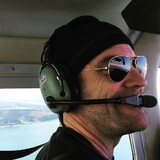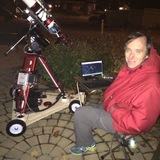INDI Library v2.0.7 is Released (01 Apr 2024)
Bi-monthly release with minor bug fixes and improvements
ASI533MC Pro and UBlox 7 GPS module
- Casey Offord
-
 Topic Author
Topic Author
- Offline
- New Member
-

- Posts: 12
- Thank you received: 0
ASI533MC Pro and UBlox 7 GPS module was created by Casey Offord
Nikon D5600
ASI120MM Mini
EQMod mount
GPSD (UBlox 7 dongle)
I just received a new ASI533MC Pro, so I changed the CCD config in Ekos to the new camera, fired everything up, and the camera is working great. Unfortunately, the GPS no longer works. The device is shown in lsusb, I see it connect in dmesg with no errors, but I get no real messages in gpsmon. If I unplug the camera, the GPS gets a fix in less than 30 seconds, as before. If I have a GPS fix with the camera unplugged, and then plug the camera in, I lose the GPS fix.
Things I have tried:
Updated all drivers
Verified no virtualgps service running
Extension cable for the gps dongle in case noise was preventing reception
GPS dongle on USB2 port with ASI533 on USB3 port
GPS dongle and ASI533 on USB3 ports
GPS dongle on USB2 port with ASI533 on powered USB3 hub
GPS dongle and ASI533 on powered USB3 hub
Burned a fresh astroberry sd card, configured, and recreated the problem exactly as above.
So...I'm a bit stumped. It's almost like an old IRQ error but that shouldn't happen with USB. Any ideas?
GPS attached, with fix, no cam
pi@astropi:~ $ lsusb
Bus 002 Device 002: ID 0bda:0411 Realtek Semiconductor Corp.
Bus 002 Device 001: ID 1d6b:0003 Linux Foundation 3.0 root hub
Bus 001 Device 004: ID 1546:01a7 U-Blox AG [u-blox 7]
Bus 001 Device 005: ID 0403:6001 Future Technology Devices International, Ltd FT232 Serial (UART) IC
Bus 001 Device 003: ID 0bda:5411 Realtek Semiconductor Corp.
Bus 001 Device 002: ID 2109:3431 VIA Labs, Inc. Hub
Bus 001 Device 001: ID 1d6b:0002 Linux Foundation 2.0 root hub
After cams attached:
pi@astropi:~ $ lsusb
Bus 002 Device 003: ID 03c3:533f
Bus 002 Device 002: ID 0bda:0411 Realtek Semiconductor Corp.
Bus 002 Device 001: ID 1d6b:0003 Linux Foundation 3.0 root hub
Bus 001 Device 004: ID 1546:01a7 U-Blox AG [u-blox 7]
Bus 001 Device 005: ID 0403:6001 Future Technology Devices International, Ltd FT232 Serial (UART) IC
Bus 001 Device 007: ID 03c3:120c
Bus 001 Device 006: ID 04b4:6572 Cypress Semiconductor Corp.
Bus 001 Device 003: ID 0bda:5411 Realtek Semiconductor Corp.
Bus 001 Device 002: ID 2109:3431 VIA Labs, Inc. Hub
Bus 001 Device 001: ID 1d6b:0002 Linux Foundation 2.0 root hub
dmesg section when cams are plugged in and GPS is working:
[ 170.159501] usb 1-1.2: new high-speed USB device number 5 using xhci_hcd
[ 170.291063] usb 1-1.2: New USB device found, idVendor=04b4, idProduct=6572, bcdDevice=32.99
[ 170.291083] usb 1-1.2: New USB device strings: Mfr=0, Product=1, SerialNumber=0
[ 170.291099] usb 1-1.2: Product: USB2.0 Hub
[ 170.293107] hub 1-1.2:1.0: USB hub found
[ 170.293481] hub 1-1.2:1.0: 4 ports detected
[ 170.629455] usb 1-1.2.3: new high-speed USB device number 6 using xhci_hcd
[ 170.760413] usb 1-1.2.3: New USB device found, idVendor=03c3, idProduct=120c, bcdDevice= 0.00
[ 170.760432] usb 1-1.2.3: New USB device strings: Mfr=1, Product=2, SerialNumber=0
[ 170.760448] usb 1-1.2.3: Product: ASI120MM Mini
[ 170.760464] usb 1-1.2.3: Manufacturer: ZWO
[ 170.969618] usb 2-2: new SuperSpeed Gen 1 USB device number 2 using xhci_hcd
[ 171.000764] usb 2-2: New USB device found, idVendor=03c3, idProduct=533f, bcdDevice= 0.00
[ 171.000779] usb 2-2: New USB device strings: Mfr=1, Product=2, SerialNumber=0
[ 171.000791] usb 2-2: Product: ASI533MC Pro
[ 171.000803] usb 2-2: Manufacturer: ZWO
Thanks,
Casey
Please Log in or Create an account to join the conversation.
Replied by AstroNerd on topic ASI533MC Pro and UBlox 7 GPS module
Please Log in or Create an account to join the conversation.
- Elias Erdnuess
-

- Offline
- New Member
-

- Posts: 8
- Thank you received: 6
Replied by Elias Erdnuess on topic ASI533MC Pro and UBlox 7 GPS module
I am 99% certain it is an issue with USB3.0 connections causing em interference with the GPS Signal.
you can test this by operating the UBlox 7 Module on a completely seperate device (for example a windows laptop), but in very close proximity to the rest of the setup.
As soon as you turn your setup on (including the USB3 connection to the astrocamera), you will lose GPS Signal. It has nothing to do with drivers or software problems. It is sadly just electromagnetic interference.
I ended up ditching the Ublox 7 gps dongle, and streaming the GPS Data from my phones GPS instead
Please Log in or Create an account to join the conversation.
Replied by AstroNerd on topic ASI533MC Pro and UBlox 7 GPS module
It’s not that, I use the same GPS in my rpi, and have no issues....
Please Log in or Create an account to join the conversation.
- Brian Davis
-

- Offline
- Junior Member
-

- Posts: 33
- Thank you received: 15
Replied by Brian Davis on topic ASI533MC Pro and UBlox 7 GPS module
Please Log in or Create an account to join the conversation.
- Gilles Gagnon
-

- Offline
- Elite Member
-

- Posts: 294
- Thank you received: 54
Replied by Gilles Gagnon on topic ASI533MC Pro and UBlox 7 GPS module
Please Log in or Create an account to join the conversation.
Replied by AirBourn on topic ASI533MC Pro and UBlox 7 GPS module
Cool - how do you do that?
Please Log in or Create an account to join the conversation.
- Elias Erdnuess
-

- Offline
- New Member
-

- Posts: 8
- Thank you received: 6
Replied by Elias Erdnuess on topic ASI533MC Pro and UBlox 7 GPS module
In short: with the android app "Share GPS" and the INDI GPS NEMA driver.
With the app, you can share a NEMA stream via Network.
The INDI NEMA driver needs to know the IP address of the phone. I use the small TP-Link travel router (30€) on the telescope to manage the network and give fixed IPs to all devices.
In the app, I set up a connection with the following settings:
Data Type: NEMA
Connection Method: TCP/IP
Port: 50000
TCP/IP Server: act as server and listen for incoming connections
I first connect my phone to the network and start the app. I then start a gps application on the phone and make sure I have a position fix. Then I connect the indi driver. It usually gets the position immediately and also syncs the exact time for KSTARS.
For some reason, this method stops working after the intitial connection. The indi driver can't get a connection to update the position or time again without restarting everything. I don't know if this is a problem with the driver or the app. But I only need the position and time sync once at the beginning of a session anyway.
Please Log in or Create an account to join the conversation.
- Brian Davis
-

- Offline
- Junior Member
-

- Posts: 33
- Thank you received: 15
Replied by Brian Davis on topic ASI533MC Pro and UBlox 7 GPS module
Given that a GEM mount is just a big clock, time matters.
Every device on your rig should be set to the exact same time. If that time is wrong, it creates an offset that your software can mostly deal with through alignment (which mainly corrects time error). But if the time changes more or less constantly, as it would using an NMEA source with continuous updating, your guiding will blow goats. If the GPSNMEA driver did update with every tz string from the GPS, it would be a constant large error source. So INDI using it once, is the correct method for NMEA-only sources.
Please Log in or Create an account to join the conversation.
- Casey Offord
-
 Topic Author
Topic Author
- Offline
- New Member
-

- Posts: 12
- Thank you received: 0
Replied by Casey Offord on topic ASI533MC Pro and UBlox 7 GPS module
Please Log in or Create an account to join the conversation.
Replied by AirBourn on topic ASI533MC Pro and UBlox 7 GPS module
Please Log in or Create an account to join the conversation.
- Brian Davis
-

- Offline
- Junior Member
-

- Posts: 33
- Thank you received: 15
Replied by Brian Davis on topic ASI533MC Pro and UBlox 7 GPS module
Please Log in or Create an account to join the conversation.
